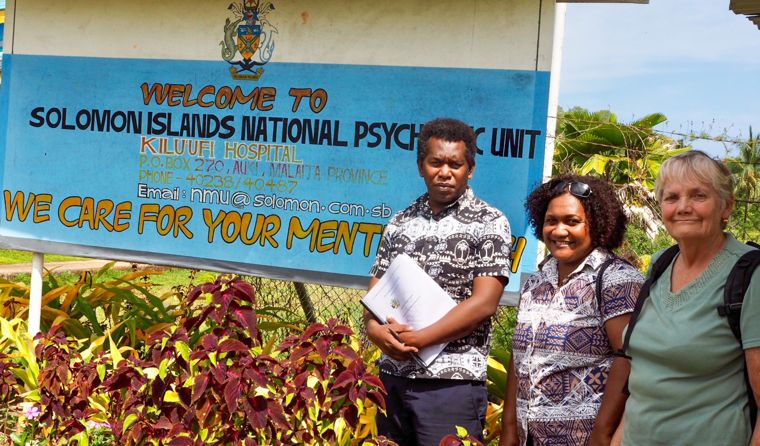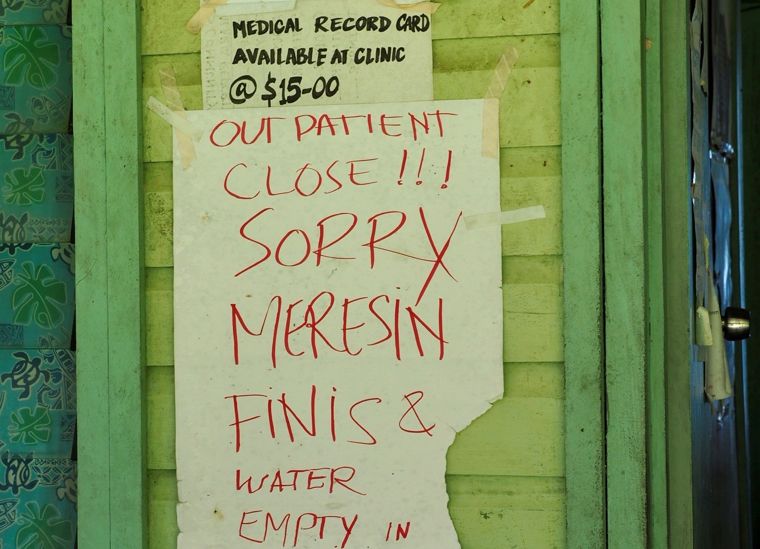Feature
‘Exciting and worthwhile’: Medical life in the Solomon Islands
newsGP speaks with two participants about their experiences in the Solomon Islands Medical Partnership for Learning, Education and Research.
 Intern suturing workshop (Image: Suzanne Pohlner)
Intern suturing workshop (Image: Suzanne Pohlner)
The opportunity to volunteer in the Solomon Islands was too good to pass up for GP and medical educator Dr Jane Barker.
‘As a young doctor I’d worked in Papua New Guinea for seven years and I’d always wanted to come back to work in a developing country. I’d been working as a medical educator in Australia, so when the opportunity came up … I was very excited and sent my application off pronto,’ she told newsGP.
Dr Barker’s post was mainly in medical education, helping to facilitate a training program and develop course curricula for a postgraduate diploma in rural generalist medicine, in response to the need for returning doctors to have capacity to work in rural areas.
The program – Solomon Islands Medical Partnership for Learning, Education and Research (SIMPLER) – replaced the previous graduate intern supervision support project and is a collaboration with Australian Volunteers International (AVI), Australian Volunteers Program, Solomon Islands Ministry of Health and Medical Services, the Australian High Commission, Honiara, and the Australian Department of Foreign Affairs and Trade (DFAT).
With the support of Australian partner organisations and medical colleges, AVI recruits volunteers for 6–18-month placements who support Solomon Island counterparts in clinical work and education. These volunteers are provided support through the Australian Volunteers Program, with additional support provided by AVI for the development and delivery of postgraduate medical education opportunities and medical workforce development activities.
To date, AVI has recruited 30 volunteers to the islands for the SIMPLER program.
Dr Barker describes her 12-month stint as a medical educator as a balance of ‘exciting and worthwhile’. Despite some challenges she expected due to financial hardship of the country, such as a lack of modern resources like solid internet connection and infection control standards, it was a very rewarding experience.
‘As the hospital was very well staffed I didn’t need to do any clinical work. So my role was basically two-fold: to supervise and participate in the intern training program, and to investigate a curriculum and the possibility of running a diploma course in rural generalist medicine,’ she said.
‘For me, the most delightful thing was working with the young doctors who are all really enthusiastic to learn, and just lovely people.
‘It was very rewarding to watch them develop as clinicians over the year of their bridging program, developing the competence and confidence to work as [resident medical officers] by the end of the year.
‘Having enjoyed teaching students in Australia too, the highlight was being able to work with young doctors and to take them through their first clinical experiences.’

Dr Jane Barker (right) with Dr Rex Maukera, head of the National Psychiatric Unit at Kilu'ufi Hospital in Malaita Province (left). (Image: Suzanne Pohlner)
Dr Barker was also lucky enough to visit the other islands and appreciate once-in-a-lifetime ‘magical’ experiences such as snorkelling and diving with turtles, manta rays and reef sharks on pristine coral reefs.
As part of her work on the program, Dr Barker also supported the delivery of a bridging internship program for medical graduates recently returned from Cuba, the Philippines, China, Taiwan and Fiji – one of the major components of SIMPLER.
Cuba began developing relationships with the Pacific Islands in the 2000s, extending offers to send medical staff and provide scholarships for medical students to train in Cuba. In 2008, a cooperation agreement saw the first cohort of Solomon Islands students sent to study medicine in Cuba, with 82 having since graduated from Cuban medical schools.
Suzanne Pohlner did an initial 18-month stint in the Solomon Islands as the administrator of the Intern Training Program in 2015.
She evidently enjoyed it so much she stayed for another 12 months to work as an advisor for the provincial health directors in the Western and Choiseul provinces, then returned last year for another 12-month stint continuing with the training program, as well as taking on a role in medical workforce development.
‘I was towards the end of a volunteer placement in Indonesia, and I was looking for another one as I’d only done six months there and enjoyed it so much, so wanted to do some more volunteering.
This one came up and it seemed to fit a lot of my skills,’ Ms Pohlner told newsGP.
‘It was not something I’d done before – I’d worked with GPs before but not really in a training program.’
Ms Pohlner was the first person involved in the bridging project in 2015 when the first group of graduates returned to start their intern training, helping to set up the administration of the program.
‘This happened after AVI realised they would have to do a more robust training program to further develop the clinical skills of the [overseas-trained doctors] returning from other countries, to ensure they were equipped to work in the Solomon Islands context,’ she said.
‘Before that they’d only ever had three or four interns at a time coming back, [but] having 24 all at once was going to be a whole different ball game.
‘The big highlight was seeing these young doctors who’d just spent seven years [training overseas] – and most of them don’t come back to the Solomons during that time – coming out of their shells and getting involved.
‘Coming back for the second time and seeing the first cohort in their clinical roles across the country was particularly gratifying.’
This observation also armed Ms Pohlner with more confidence to try new things beyond her scope of usual practice in Australia.
‘I learnt a lot. It was a new experience, as the role I had wasn’t something I’d ever specifically done. I got to do so many things I would never get to do in Australia, at a much higher level [such as] making policies at ministerial level,’ she said.
‘People are just thankful – even though I didn’t have all the skills to begin with, they were happy for me to learn as I went along and because I had a different set of skills, they were grateful for what I could do for them.
‘So it certainly gave me a lot of confidence to go ahead and try things, even if I didn’t necessarily have the experience. It gives people a real opportunity to test their skills.’

Signs indicating no medicine or water were ‘not an unusual sight in the rural medical clinics’. (Image: Suzanne Pohlner)
Dr Barker’s 12-month placement was cut short when she broke her leg, and she was then unable to return to the Solomon Islands from Australia due to the COVID-19 pandemic.
‘It was a bit of an abrupt end to what would have been a two-year stint. I was disappointed that I didn’t get to finish my rotation, but I really enjoyed the year I was there,’ Dr Barker said.
‘The future of international travel is uncertain, but if there was a chance to go back for a short stint I would definitely consider that.’
Both Dr Barker and Ms Pohlner continue to work on the program remotely from Australia, in partnership with the Australian College of Emergency Medicine (ACEM) Global Emergency Care Faculty, writing course material and supporting the National Referral Hospital in Honiara, Solomon Islands, to keep the bridging program going, as well as developing the postgraduate rural generalist program.
‘One of the gaps I found while I was in the Solomons was that we didn’t have that many GPs, and there was a real need for generalists,’ Dr Barker said.
‘Certainly if we start running the rural generalist program then I think we’re going to need more generalist doctors, and for training.’
‘These volunteer roles will suit anyone with an interest – not just clinically but in medical education or helping with curriculum design.
‘This sort of opportunity is really exciting because in Australia we have very well developed generalist pathways, and to translate those into a low-income country is interesting and very important.
‘It’s a wonderful opportunity in your career to be able to work in a country like that and offer something useful.
‘The experience of being a volunteer goes beyond work, and the Solomon Islands offer so many opportunities for adventure and the chance to visit remote villages and become immersed in the amazing culture.’
Log in below to join the conversation.
medical training Solomon Islands volunteer
newsGP weekly poll
Health practitioners found guilty of sexual misconduct will soon have the finding permanently recorded on their public register record. Do you support this change?